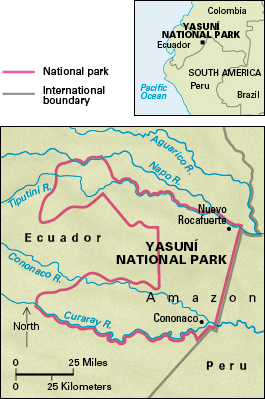Yasuní << yah soo NEE >> National Park is a nature reserve in the Amazon tropical rain forest in the South American country of Ecuador. It covers about 2,400,000 acres (970,000 hectares) in the northeastern part of the country. The park was established in 1979. In 1989, it was designated a biosphere reserve by the United Nations Educational, Scientific and Cultural Organization (UNESCO). Such reserves are sites for testing the sustainable development of an environment.

Yasuní is a wonderland of plant and animal life. It is home to more than 3,000 species (kinds) of plants, nearly 600 species of birds, about 380 species of fish, and 80 species of bats. A 2.5-acre (1-hectare) area of the rain forest may contain 100,000 species of insects. This is approximately the same number of insect species known to exist in all of North America. The park is noted for its dense jaguar population.
Yasuní also is home to a number of Indigenous (native) peoples, including the Tagaeri and Taromenane. These groups live in voluntary isolation in a protected area called the Zona Intangible (Untouchable Zone). They do not wish to have contact with the modern world.
The park is a remote destination for visitors. Some resorts and tour guide companies offer ecotourism packages. Ecotourism is tourism that promotes conservation. Riverboat trips and hiking are popular activities for hardy travelers.
Yasuní National Park contains oil reserves worth billions of dollars. Oil extraction in the area has met opposition from environmental and Indigenous groups. From 2007 to 2013, Ecuadorean President Rafael Correa supported an international fund-raising initiative to stop drilling for oil in the park. However, the initiative did not raise sufficient funds, and drilling continued. In 2023, in a nationwide referendum, Ecuadoreans voted to end drilling in an oil-rich area of the park. A referendum is a direct public vote on a proposed measure.
